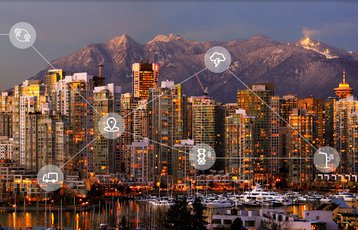The eleventh of the United Nations’ sustainable development goals for 2050 is to make cities inclusive, safe, resilient, and sustainable by “creating career and business opportunities, safe and affordable housing, and building resilient societies and economies.” By that same year, 70% of the global population is expected to live in urban areas.
Given the state of many of today’s cities, where issues such as pollution are prevalent, there is much to be done to get us from where we are to where we need to be.
In today’s cities, everything operates in silos. Education, hospitals, roads and infrastructure, and technology providers and data centers typically operate independently. There are many consequences to this. Individual entities research and implement their own solutions and the end results don’t always serve the collective best interests.
The evolution of smart cities
Smart cities use technology to connect all of the entities within it, to ensure cohesive efforts are serving the best interests of the city, the environment and citizens. As an example, 5G can detect traffic and pedestrian patterns so traffic lights can be automated to enhance pedestrian safety and to clear intersections when emergency vehicles need to get through. Post-pandemic, smart cities are thought to be more important than ever. In a study of 167 cities worldwide, more than two-thirds said smart city programs are crucial to the future.
Smart cities make significant investments in information and communications technology and the corresponding infrastructure to create an intelligent network capable of transmitting data throughout an urban environment using wireless technology and cloud computing. A healthy, smart city ecosystem allows citizens to use their devices to access information and services quickly and seamlessly and empowers cities to streamline operations, optimize infrastructure, and make better, faster decisions informed by real-time data. The result is that resources and services are managed more efficiently to improve operations across the city.
There are many players who need to participate in order to build healthy smart city ecosystems. Telecommunications companies that deliver 5G technology, edge data centers and traditional data centers are all crucial to building a smart city ecosystem to proliferate, scale and safeguard smart city solutions.
The fact is that it’s too costly for any one entity to build, scale and proliferate the innovations that are necessary for smart cities to thrive, alone.
This was one of the key messages delivered by Tess Van Thielen, Vice President, Advanced Services, Rogers for Business during her DCD keynote presentation: How will the world of telecommunications and data infrastructure converge to support the ‘smart city’?
Rogers’ role in the smart city ecosystem
Rogers was the first operator to bring 5G to Canadians in early 2020, and over the past year and a half, it has delivered 5G connectivity to over 800 communities across Canada, now reaching over 50 percent of Canadians. By the end of 2021, over 1,000 communities – more than 70 percent of the population – will have access to Rogers 5G. Rogers is also a pivotal conduit for companies wanting to do business in Canada. The company is known globally for its commitment to innovation and collaboration and consistently seeks out partnerships to foster a healthy smart city ecosystem.
Rogers is also a founding member of the 5G Future Forum, which is creating a common framework for 5G applications across the Americas, Asia-Pacific and Europe. Without a doubt, 5G systems are necessary to the success of smart cities.
In Canada, Rogers partners with world renowned academic institutions, technology think tanks and municipalities and cities themselves to innovate smart city solutions, such as those listed below.
Smart buildings: Rogers equips smart office buildings in Canada’s largest city centers with the capacity to automate utilities such as heat and water to improve the building’s efficiency, while enhancing the wellbeing and productivity of its occupants.
Smart infrastructure: Rogers’ 5G technology allows municipalities across Canada to harness real time data and insights to pinpoint flaws in the sewage system that can be automatically repaired to reduce costs, inefficiencies and the impact on the environment.
Smart mining: Through Rogers’ testbed at the University of British Columbia, the company pilots a low latency 5G service to equip autonomous model hydraulic mining trucks to process sensory information in real time. In the real world, Rogers’ 5G technology enables autonomous model hydraulic mining trucks to be loaded up with 100kg and navigate on-road and off-road terrain safely and securely – delivering hundreds of millions of dollars of savings, while improving sustainability in the mining sector.
Smart traffic control: In Kelowna, British Columbia, sensors powered by Rogers 5G network have been installed in the downtown core. These sensors gather anonymous vehicle and foot traffic patterns. Researchers will use this data to improve vehicle, pedestrian and cyclist safety, and develop technology to instantly deploy emergency vehicles when a collision is detected by the sensors.
These Canadian examples are very much illustrative of the types of smart city innovations that are being investigated and pursued across verticals worldwide.
“This is an exciting and fascinating time as technology moves from monitoring and remote management to full automation,” said Tess Van Thielen, Vice President, Advanced Services, Rogers for Business. “The entire telecommunications industry has an opportunity to work together to make the unknown and seemingly impossible, possible.”
As an innovation leader in 5G, the IoT and smart cities, Rogers welcomes new opportunities to innovate and collaborate with global entities across the telecommunications sector. To get in touch, visit us here.
More...
-

Building an Internet for the Moon
NASA’s moon-based LunaNet will be one step towards bringing the Internet to the rest of the solar system
-

Are data centers, accidentally, the best kept secret-industry?
Quite possibly, and in equal measure to their importance.
-

Why smart cities are both incredible and inevitable
And your data center needs to be prepared

